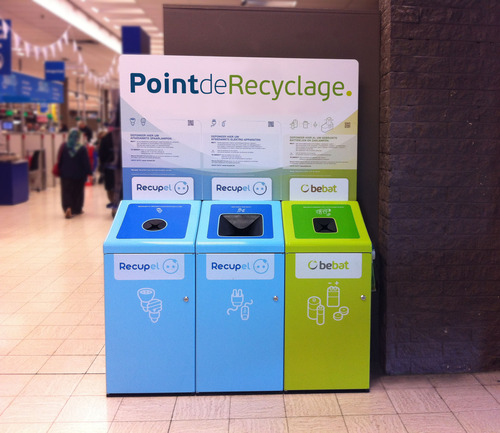Bebat – the national PRO for batteries in Belgium – has set up competitions among schools and secondary education institutions for the selective collection of this waste stream. At least once a year, it organises collection campaigns throughout the country in order to collect as many used batteries as possible over a certain period. A prize for the winning school is for example the organisation of a live concert of a popular musician in the school itself (this is done in cooperation with a major media company). Furthermore, Bebat has developed a special “saving programme” where schools can accumulate value points corresponding to quantities of batteries collected. These value points can later be exchanged against different types of goods or services (a reduction on public transport tickets for instance).
For WEEE, the national PRO Recupel has a similar initiative, but targeting entire municipalities. So far, two rounds of the competition have been organised and the prize has been a “gigantic picnic” for all the inhabitants of the winning municipality. In the second edition, in 2015, more than half of all the Belgian municipalities took part, collecting 8 830 tonnes of WEEE during the duration of the campaign (one week). For comparison, the annually collected quantities of WEEE amount to 111 357 tonnes (equivalent to a weekly average of 2 100 tonnes) (Recupel, 2016). One of the key objectives of the initiative was to make citizens more aware of the fact that they have the possibility to discard their small WEEE and lamps not only via the most common and well-known channels (civic amenity sites and reuse centres) but also via drop-off points at retailers.
This latter objective is further enhanced by a joint initiative of both PROs. It is called “Recycling Point” and aims to promote an even more efficient collection of batteries, lamps and small WEEE (smaller than 25 cm) through the instalment of collection points at retail stores. This has a number of advantages:
- increased convenience for the consumer: they are able to dispose of unused WEEE in the same place where they do their regular shopping;
- better reputation and more traffic for the retailer: the collection points are very visible and can attract more consumers to their premises;
- increasing collected quantities for the PROs: this is the ultimate objective of the PROs in order to fulfil the legislative requirements.
In fact, every store selling batteries and/or EEE is obliged to also take back used products, even if they have not been originally bought at the store. When becoming a host to a “Recycling Point”, the PROs take on this take-back obligation from the store free of charge – they provide the necessary collection material, ensure timely collections and guarantee the subsequent proper treatment of the waste. In addition, Bebat offers this service to other big generators of battery waste (such as companies or schools).
Partly because of regional legislation, Recupel also has some initiatives to promote reuse of EEE through the work of social economy actors. The conditions are put down in a cooperation agreement between Recupel and two federations of social economy companies active in reuse, repair and recycling (Ressources for the territory of the Brussels-Capital and Walloon regions and Komosie for the region of Flanders). In 2015, this led to the placing of about 788 tonnes of used EEE on the Belgian second-hand market, contributing to the creation of around 350 jobs in the sector (RTBF, 2016).
